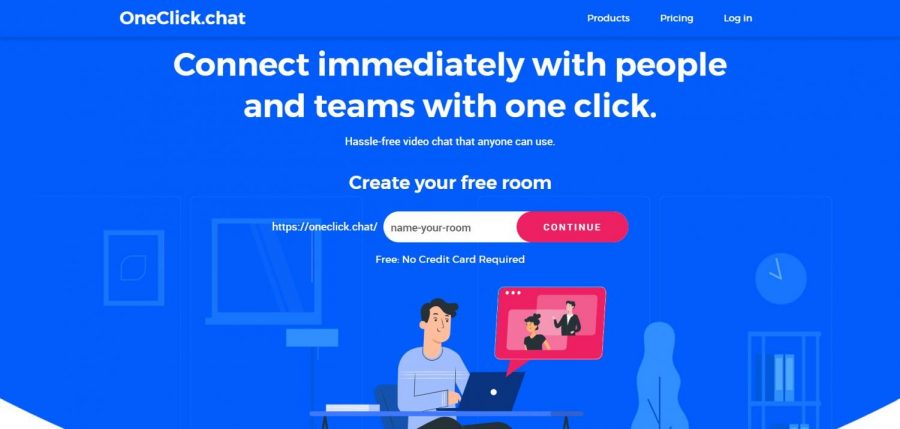University partners with OneClick to study impacts of video technology
Photo Courtesy of University of Illinois
The homepage of the OneClick website, which provides free video chat to users, rests on Sunday.
Jun 1, 2020
University professors Wendy Rogers and Raksha Mudar are leading a team in collaboration with OneClick.chat to study the social interaction of older adults on video technology. They have received a grant of $850,000 from the National Institute of Aging to enhance the study.
OneClick is a web-based video chatting platform that was created in order to make video conferencing straightforward and simple for all ages.
“We’re a web-based video platform, which means that, compared to Zoom and Skype, all you need is a link to access a group video chat or an event,” said Dillon Myers, CEO and co-founder of OneClick. “You never have to download anything to your computer, and you don’t have to create an account to participate.”
The study is currently in its second phase which will allow the platform to be tested in communities in order to observe its effectiveness.
The communities that will take part are the Clark-Lindsey Village, CRIS Healthy-Aging and CJE SeniorLife.
Get The Daily Illini in your inbox!
“The whole goal of the study was mostly to study social engagement using a bigger technology platform called OneClick.chat, and the plan is for us to study older individuals with mild cognitive impairment,” said Raksha Mudar, Associate Professor in the Department of Speech and Hearing. “We know that social engagement is really important for health and well being. Now we know that one of the ways in which people can engage is (through) video technology.”
The coronavirus has also highlighted the impact social isolation has on the older population as they are unable to communicate with their loved ones or chat with friends due to social distancing rules. This has allowed the study to gain a great deal of importance over time according to Myers.
“Over the last few months, one of the very few silver linings is our ability to help support a lot of the older adults, who are having a difficult time connecting because they aren’t allowed to or that they can’t,” Myers said. “But we’re so grateful to have received this funding to really move this research along because I think it’s important and the consequences of this social distancing are going to only have the potential to increase the risk for social isolation if they can’t interact with people in person right now.”
The study continues to highlight the importance of social engagement for older adults who have cognitive health impairments that affect their physical and mental wellbeing. The first phase of this study allowed those individuals to interact with others and help their overall health through the accessibility of the video technology.
“In the past year, we have done (a) pilot study with a smaller group of individuals. And what we’ve seen is that they are able to use this platform, technology platform very easily, and they’ve enjoyed using the platform to interact with others,” Mudar said.
According to Myers, the actual study will not be conducted on participants until the first half of next year as the team is currently in the preparation stage after receiving the funding in early May.
“There’s really two goals. One is to prove the efficacy of OneClick in Improving health outcomes of older adults, including those with mild cognitive impairment,” Myers said. “Then the second, and it is related is to put OneClick.chat in the best position to commercialize and be as widely available to make an impact possible.”






